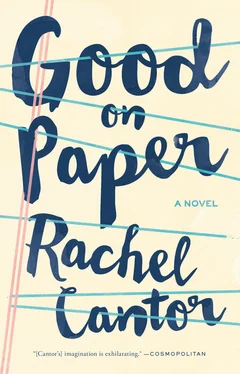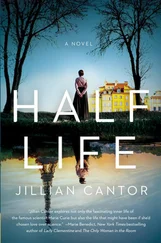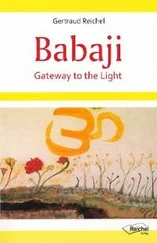The box was empty; I threw it away.
Really? I asked, hoping Ahmad couldn’t sense how crestfallen I was.
A scanner arrived, by the way. I insisted to DHL that I was Shira Greene.
I laughed.
Hey, I said, I think I know why Romei is so interested in translating his work into English!
Oh? Ahmad had surrendered again to his hazy gloom.
His wife doesn’t speak Italian, can you imagine? Benny told me.
Again with the Benny, always with the Benny. How does he know?
Oops! I shouldn’t have said. He knows Romei, and Esther. Don’t say anything.
You’re confusing me, Shira. It’s too early. I heard you come in last night, by the way.
(I may have tripped on the umbrella stand; I may have reprimanded said umbrella stand.)
Be careful, he said. I don’t want to have to pick up the pieces.
There’s always another umbrella stand, I said, knowing that wasn’t what he meant at all.
Ho, ho, he said, but not in a jolly way.
I picked up a bald donut.
I haven’t heard from her, if that’s what you’re wondering.
Really? I asked.
Not since I agreed to cooperate.
You must be on email day and night, I said.
The time difference doesn’t help, he said.
I’m sorry, I said.
Ahmad shrugged.
No Connecticut if Hassan stays where he is, right? I wanted to ask, but didn’t.
I’ve made a cock-up of my life, Shira. Mistake after mistake. I look back, though, and don’t see how I could have done differently.
You’ve done good, Ahmad, I promise!
Maybe, he said, maybe not. If I ever lost you guys, if I ever lost Andi …
Why would you lose us? Why would you lose Andi?
He gave me a sharp look, then softened.
Right, he said. Why ever?
It wasn’t an apology, but it would do.
34. THE CHARMING CHIASMUS

I went online and found an email from Benny: Thanks for the visit. Sorry if I acted weird. Love trouble. (Don’t you love that section in Vita Nuova where Dante talks about love as if it were susceptible to reason, then concludes that love makes him unreasonable?)
It was true! As Dante writes poems of love, he muses: love is good because it keeps us from thinking vile thoughts. But it’s also not good because the more faithful he is, the harder his trials. He writes a sonnet, then, saying he’s confused, his theme is confusion.
There was more: I’ve left a present for you. In the lobby .
I ran downstairs like a child. There, in a padded envelope, The Song of Songs , Ariel and Chana Bloch translation.
Excited, and hungry, I brought it to the Eight Bar.
At night, the Eight Bar was a blues club where dapper old men played harmonica and called other old men up to the stage: Sonny Boy, is that you? Stormin’ Eddie, get up here! while awestruck undergrads looked on, clutching their collectible albums. I’d been something of a regular before I became a loco parenti . I found a booth in back, well beyond the reach of drunken darts, and ordered a junior-size Junior Wellsburger.
I’d read my share of scripture in grad school, but of the Song I knew only what Bernard of Clairvaux had said of it eight and a half centuries ago. Bernard, because he was Dante’s biggest crush, able to travel farther in Paradise than even Beatrice herself. In his lifetime, Bernard was best known for his eighty-six sermons on the first two chapters of the Song —yes, eighty-six sermons on a mere eighteen verses, sermons about the redemptive power of love, the intimate relationship between Christ and His flock. Bernard was clear that the Song was not an erotic tale. No, it was the very opposite of an erotic tale! There was nothing carnal about that book, he insisted, nothing whatsoever .
Reading the Song now for the first time, I could see why he needed eighty-six sermons to make his point. For a description of purely “spiritual” love, the Song is all about the senses. The sound of a lover’s voice, the singing of birds. The vision of a lover’s beauty. The taste of milk, honey, and wine. Lovers’ bodies exuberant — dancing, running, bounding, chasing — and luxuriant — embracing, leaning, resting in bowers, on couches, in beds. All of nature flowing, flourishing, flowering.
And the lovers, the Shulamite and her “king”: they believe in each other, they believe in themselves; they do not hesitate, they will not hold back. It was hard to imagine a love story more different from that of Vita Nuova . If Dante only looks at Beatrice, if he only rarely hears her speak, and certainly never tastes, touches, or smells her, these lovers revel in senses that blur boundaries (two points, no longer clearly separate, become one point, which is the point).
The Song has two heroes, moreover. Neither is a symbol, an idea of perfection, neither waits patiently or in peril while the other fulfills his destiny. Quest is unnecessary: in their happy world of lyric fulfillment, they have no need for heroes or new life, no need to look behind Door Number Two.
My beloved is mine, and I am his . Close enough to I am my beloved’s and my beloved is mine . The source, I was beginning to understand, of the inscription on my father’s wedding ring.
I called Benny.
I am my beloved’s and my beloved is mine, I said.
It’s a bit early for declarations, he said.
Where from? I asked.
The charming chiasmus? he said. King James, Song of Songs , 2:16. Ani ledodi ve dodi li .
Nicer in King James than the Bloch version, I said. Thanks for that, by the way.
What’s that? Benny was talking with someone who wasn’t me. Be right there, pumpkin. Sorry, Shira, gotta go.
My heart beat too quickly, tears welled.
Benny’s pumpkin. His voice, speaking to her, was kind, it was gentle. Had anyone ever spoken to me that way? You don’t get to be pumpkin shagging your boss, not if you’re a temp.
I could (almost) imagine Benny and his Maid Marie luxuriating in their fragrant bower, Benny making plaits of Marie’s green hair as she strained to finish her word find. But I couldn’t imagine myself there. I tried! I tried to imagine myself — with Benny, with anyone —shooting spikenard or dropping myrrh, but I couldn’t. I could imagine desire, I could imagine seasonal flings, but not tender reciprocity, not the charming chiasmus. Even at fourteen, when I danced for T. in the chem lab, I was no Shulamite — I called myself Salomé, veiled even then. When I imagined love now, it was Love Lite I imagined — or, more often, the end of love: waiting at the airport, the ring on T.’s finger, my father being rolled away.
Prelapsarian Shira, innocent Shira, Shira before T., Shira before marriage, the Shir haShirim Shira was gone, the Flying Girl grounded.
I looke down, was startled to find a Junior Wellsburger sitting cold on an oval plate, next to a side of Jimmy Witherspoonbread. Freshmen were tossing darts, drunk already, or pretending to be. I found I’d lost my appetite.
35. WHAT COMES AFTER ONCE UPON A TIME?

I finished trotting “Call” and “Screen,” and this is what I found: aside from the echoes in Romei’s first poem, my lexicon of oft-repeated words contained just one entry: Romei’s omnipresent penna (his pen, wing, man of letters, writer). Had I missed something? He repeated the usual articles and prepositions ( I figured rather frequently; she almost as often), but nothing substantive — no important nouns or modifiers. As if the New Life involved finding a new word for every situation, as if nothing I’d ever done could help me now.
Читать дальше













